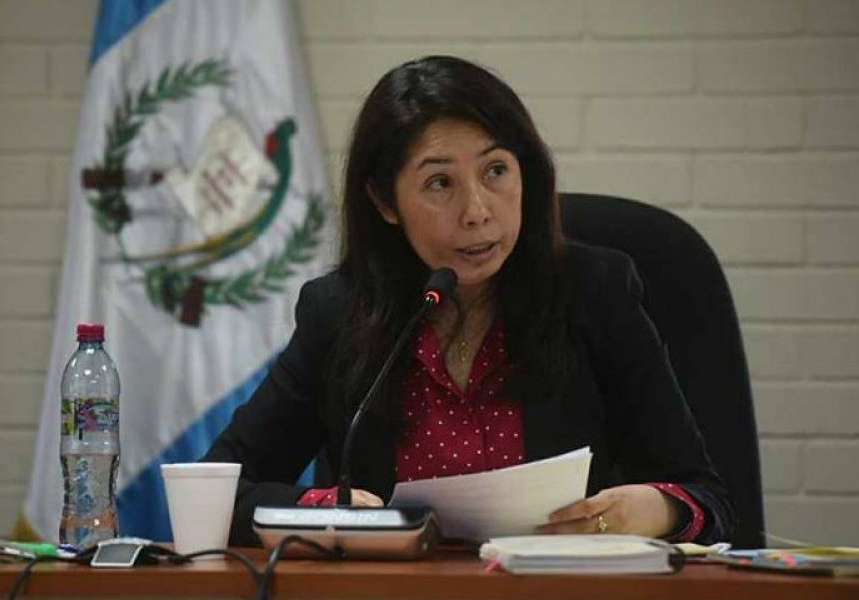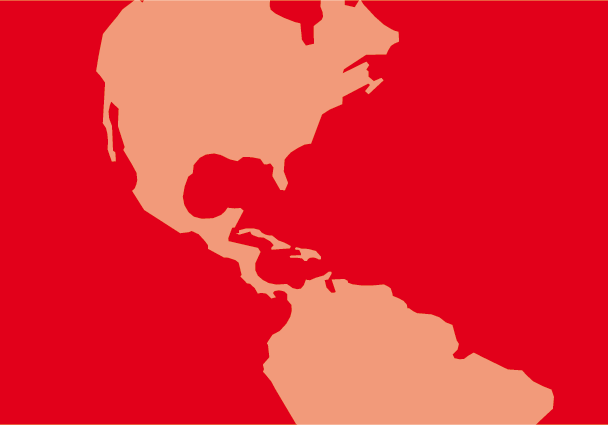
May 29, 2018 | News
The ICJ is deeply concerned about the recent attacks against Judge Erika Aifán that put judicial independence in Guatemala at imminent risk. Judge Aifán has always been upright and honest in her rulings, which she bases on sound principles of the rule of law.
Ramon Cadena, Director of the Central American office of the ICJ stated today: “We must support Judge Aifán because the guarantee of judicial independence is under serious threat.”
“Judge Aifán is an honest and brave Judge presiding over emblematic cases, which could be put in jeopardy if the legal actions against her proceed,” he said.
“It is totally unacceptable that a Court imposes a fine against a professional carrying out their duty. The Judges of the Third Court who imposed this fine should be investigated by the Public Ministry on account of their actions, which constitute an attack on judicial independence,” he added.
The ICJ firmly believes that the independence of judges is essential to uphold the rule of law so that public officials can effectively guarantee access to justice for victims of human rights violations.
The Inter-American Commission of Human Rights (IACHR) has established that “the independence of the judicial power has been recognized as a general principle of law and enshrined in many international treaties”.
For that reason, and with reference to the Guatemalan Constitution and international human rights standards, the ICJ considers that the Guatemalan Supreme Court should take an active role in the defence of judicial independence and in this specific case concerning Judge Aifán.
The ICJ also urges the UN Special Rapporteur on the Independence of Judges and Lawyers to visit the country.
The ICJ also considers that the Guatemalan Prosecutor for Human Rights should submit the case to the IACHR so that that Commission can grant preventive measures to Judge Aifán and investigate this flagrant violation of judicial independence.
The ICJ also requests that the IACHR intervenes in the present situation.
The ICJ considers that the motives for the attacks against Judge Aifán are because she is currently presiding over emblematic cases in the fight against impunity and corruption.
Groups who are interested in maintaining a situation of impunity wish to see her removed from her position.
The ICJ recalls that a judge can only be removed from office for reasons established by law, following a disciplinary process that complies with the basic guarantees of a fair trial; or when a judicial officer has completed the term of their mandate.
Neither of these conditions is met in the case of Judge Aifán. Therefore, the ICJ can only conclude that the attacks against her are attacks on the independence and impartiality of the judiciary as a whole.
It is self-evident that the independence of every judicial body is indispensable for the fulfilment of fair trial standards without which the right of access to justice is undermined.
Furthermore, without judicial independence, people lack confidence in the courts or are fearful and therefore refrain from taking cases to justice.

Apr 30, 2018 | Comunicados de prensa, Noticias
La CIJ enumera varias consideraciones y recomendaciones para asegurar la elección de un Fiscal General independiente.
La CIJ expresa:
1. La Junta Proponente para la elección del Fiscal General deberá llevar a cabo un proceso público y transparente, con el objeto de devolver al pueblo de Honduras la credibilidad en la justicia y presentar al Congreso Nacional una nómina de 5 personas seleccionadas por razones fundadas en méritos de capacidad, idoneidad, independencia, integridad moral y honestidad. En la segunda fase, el Congreso Nacional también deberá de implementar un proceso público y transparente, que permita nuevamente la fiscalización por parte de la sociedad hondureña del proceso de elección de la cabeza del Ministerio Público.
2. En la primera fase, la Junta Proponente debería utilizar las herramientas del perfil, tabla de gradación y entrevista pública, con el objeto de determinar a fondo si la o el profesional reúne las condiciones para ser preseleccionada por razones fundadas en méritos de capacidad, honestidad, independencia, integridad moral e idoneidad y no únicamente por predilecciones o prejuicios. La CIJ ha podido constatar en procesos similares anteriores, que la Junta Proponente cumple con los requerimientos formales, pero no hace un esfuerzo para seleccionar a los mejores candidatos y cumplir así con los estándares internacionales sobre el fondo de la elección, y en particular las Directrices sobre las funciones de los fiscales, de las Naciones Unidas.
3. Dado el controvertido desempeño en la función del actual Fiscal General, la CIJ considera que no es recomendable su reelección, toda vez que existen legítimas y serias dudas de que no reúna las condiciones establecidas por los estándares internacionales. En este sentido, es necesario e importante, investigar y definir si el Fiscal General actual, actuó con absoluta independencia y honestidad durante su gestión.
4. La Junta Proponente y el Estado de Honduras deben asegurar que el proceso de elección del próximo Fiscal General en todas sus fases, garantice una elección de personas únicamente basada en méritos, idoneidad y competencia profesional e integridad moral y honestidad y no en predilecciones o prejuicios. Ello constituye una salvaguarda fundamental para una recta e independiente administración de justicia y para evitar riesgos de parcialidad del Fiscal General.
5. Al respecto la Comisión Interamericana de Derechos Humanos (CIDH) también ha reconodido la importancia de que los Estados establezcan salvaguardas para evitar las negociaciones entre partidos políticos. La CIJ considera que estas salvaguardas serían necesarias y apropiadas para la actual elección, tomando en cuenta que en Honduras las negociaciones entre partidos políticos, son una práctica constante y reiterada en estos procesos;
6. Si bien es importante la presencia de la Sociedad Civil en la Junta Nominadora, la CIJ pudo constatar que existen razones fundadas para cuestionar dicha participación, por tratarse de un proceso de participación viciado. Así lo ha declarado la Sala Constitucional, al resolver con lugar la inconstitucionalidad de la reforma de la Ley del Ministerio Público, que habilitaba la participación de un representante de la sociedad civil en la Junta Proponente.
7. En tal sentido, la CIJ considera que la Junta Proponente debería ceñirse a lo establecido en la Ley con respecto a la integración de la dicha Junta. El Presidente de la Junta Proponente debería verificar que todos los miembros de dicha Junta, sean idóneos para integrarla y que cuenten con las calificaciones jurídicas apropiadas, para llevar a cabo tan importante misión con transparencia, independencia, imparcialidad y honestidad.
8. La CIJ insta a la Misión de Apoyo contra la Corrupción y la Impunidad en Honduras (MACCIH), que lleve a cabo una investigación profunda acerca de este proceso y para determinar el cumplimiento de los estándares internacionales, cuyo respeto constituye la principal garantía para que el próximo Fiscal General, sea una persona independiente y electa en base a méritos y no por preferencias.
Ramón Cadena, Director de la CIJ para Centro América expresó: “La o el Fiscal General es una autoridad pública que en nombre de la sociedad y del interés público, debe asegurar la aplicación de la ley y perseguir los delitos. Por ello, el Estado de Honduras debe llevar a cabo un proceso que permita culminar con la elección de un Fiscal General independiente y designado por razones fundadas en méritos y no en predilecciones, y que reuna las condiciones exigidas por los estándares internacionales.”

Apr 12, 2018 | Articles, Nouvelles, Publications
Aujourd’hui, la CIJ a lancé son nouveau rapport Le jugement de civils par des tribunaux militaires au Venezuela. Il n’est cependant disponible qu’en espagnol.
Le rapport analyse le cadre constitutionnel et juridique de la juridiction pénale militaire du Venezuela, sa structure, sa composition et sa compétence.
Le rapport aborde également les graves problèmes d’indépendance de la juridiction pénale militaire vénézuélienne et la pratique du jugement de civils par des tribunaux militaires dans ce pays, à la lumière des normes internationales et des principes de l’Etat de droit.
Il récapitule les recommandations relatives à l’administration de la justice par les tribunaux militaires qui ont été adressées au Venezuela par divers organismes et procédures internationaux de protection des droits de l’Homme, tant au sein des Nations Unies que via le Système interaméricain.
Enfin, le rapport conclut que les tribunaux militaires vénézuéliens ne remplissent pas les conditions nécessaires et inhérentes à une bonne administration de la justice, institué par l’article 14 du Pacte international relatif aux droits civils et politiques, et que le jugement de civils par des tribunaux militaires constitue une violation flagrante du droit à un tribunal indépendant, impartial et compétent et est incompatible avec les normes et standards internationaux relatifs à l’administration de la justice.
Venezuela-Civiles Tribunales Militares-Publications-Reports-Thematic Reports-2018-SPA (le rapport complet, en espagnol et en PDF)

Apr 12, 2018 | Artículos, Noticias, Publicaciones
Hoy la CIJ lanza su informe El juzgamiento de civiles por tribunales militares en Venezuela.
El informe analiza el marco constitucional y legal de la jurisdicción penal militar de Venezuela, su estructura, composición y competencia.
Igualmente, el informe aborda los graves problemas de independencia de la jurisdicción penal militar venezolana y la práctica del enjuiciamiento de civiles por los tribunales militares de ese país, a la luz de estándares internacionales y de los principios del Estado de Derecho.
Asimismo el informe relaciona las recomendaciones sobre administración de justicia por tribunales militares que han venido formulando a Venezuela distintos órganos y procedimientos internacionales de protección de los derechos humanos, tanto en el ámbito de las Naciones Unidas como del Sistema Interamericano.
Finalmente, el informe concluye que los tribunales militares venezolanos no satisfacen las condiciones necesarias e inherentes a una recta administración de justicia, establecidas por el artículo 14 del Pacto Internacional de Derechos Civiles y Políticos, y que el juzgamiento de civiles por tribunales militares configura una violación flagrante de los derechos a un tribunal independiente, imparcial y competente y es incompatible con las normas y estándares internacionales sobre administración de justicia.
Venezuela-Civiles Tribunales Militares-Publications-Reports-Thematic Reports-2018-SPA (el informe, en PDF)

Apr 12, 2018
Today the ICJ launched its report The Trial of Civilians by Military Courts in Venezuela (available only in Spanish).
The report analyzes the constitutional and legal framework of Venezuela’s military justice system, its structure, integration and scope of jurisdiction.
The report addresses the serious problems regarding the independence of the Venezuelan military justice system and the practice of prosecuting civilians by the military courts of that country, in light of international standards and the principles of the rule of law.
It also highlights the recommendations on the administration of justice by military courts that have been made to Venezuela by various international authorities charged with the protection of human rights, both within the United Nations and within the Inter-American System.
The report concludes that the Venezuelan military tribunals do not meet the necessary conditions for a fair administration of justice, including as provided by Article 14 of the International Covenant on Civil and Political Rights.
In particular, it underscores that the trial of civilians by military courts constitutes a violation of the right to an independent, impartial and competent tribunal and is incompatible with international law and standards on the administration of justice.
Venezuela-Civiles Tribunales Militares-Publications-Reports-Thematic Reports-2018-SPA (Full report, in Spanish, in PDF)









